John grew up in Ann Arbor, Michigan, during one of its headiest musical periods, the mid-’60s and early ‘70s. He was the little brother to two songwriter-musicians, David and Scott Morgan. Scott was the teenage frontman for blue-eyed soul prodigies The Rationals and then a member of Sonic’s Rendezvous Band.
Sonic’s Rendezvous Band was a vehicle for the unique talents of Fred “Sonic” Smith, Scott Morgan, ex-Stooges drummer Scott “Rock Action” Asheton and bassists Ron Cooke and then Gary Rasmussen and remain rock and roll’s great lost treasure.
John was privy to some of the inner workings of Sonic’s Rendezvous Band, seeing them at one of their earliest shows and following them until they dissolved. Through his connection to them, Morgan found himself drumming for Gang War, the mercurial but ultimately ill-fated “super group” fronted by Johnny Thunders (New York Dolls, Heartbreakers) and Wayne Kramer (MC5) from 1979-80.
We coaxed John Morgan into pulling up a stool in the I-94 Bar to tell us his story.
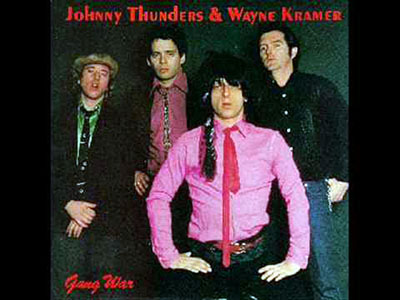 John Morgan (left) with Wayne Kramer, Johnny Thunders and Ron Cooke.
John Morgan (left) with Wayne Kramer, Johnny Thunders and Ron Cooke.
Q You grew up in a house full of music. I read a Retrokimmer piece where you took to a drum set belonging to Rationals drummer Bill Figg at the age of nine. Talk a bit about the Morgan family homes, growing up in Ann Arbor generally and what the other members of the Morgan clan got up to, musically…
Yes, Bill Figgs’ were the first drums I started playing at my parents basement, in their first house on 408 Westwood on the west side of Ann Arbor. Then my brother David bought a set and I started practicing on his. He had a blue sparkle Ludwig Hollywood set.
My Mom and Dad were both musicians and teachers. Mom played marimba with the Michigan Normal College Orchestra and Dad played clarinet and taught school in music. My Dad thought a singer should sing like Perry Como and told Scott: ‘This is what a singer should sound like.’ My Mom liked big band swing music and saw a lot of the big-name bands like Glenn Miller and Benny Goodman at the casinos around the Ann Arbor-Michigan area
Deon Jackson used to come over to our house and would try to sell songs to The Rationals. I think he gave ‘I Know Why Little Girls Cry’ to them. Bob Seger used to come over to the house. Mike Lutz from Brownsville Station lived around the corner and Scott used to go over there to record parties.
Scott used to throw his own record parties in my parents’ basement. Ollie McLaughlin lived down the street in Ann Arbor. He was famous for discovering celebrity singers like Barbara Lewis and Deon Jackson and was a producer. One of the guys from Johnny and the Hurricanes was in the neighborhood, and we used to see their Volkswagen van with their name painted on the side.
So there was music all around us, all the time.
Q You went to Ann Arbor’s Pioneer High, which produced quite a few notable musical names. Anyone special with you in your year?
Not too many notable artists during my graduation year at Pioneer which was 1973. My sister Jean went to school with Ken Burns who was 1970. Most of the artists graduated in ’65, although ’67-68 would have been Deon Jackson, Bob Seger, Jimmy Osterberg, Ron Asheton and Scott Asheton. Dave Alexander, too.
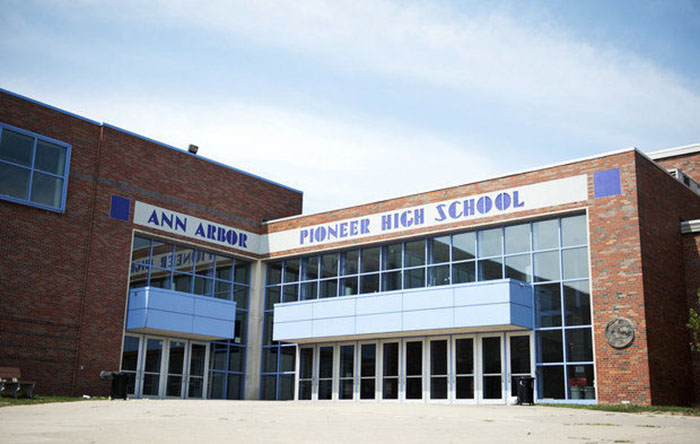
Q Your own beginnings were classic garage band but, like Scott, you went in another direction and on to have an early taste of success. I’m jumping ahead a little but how old were you when you played the Montreux Jazz Festival and how did that come about?
It was with Vantage Point in Switzerland 1979 and we were on the bill with Willie Bobo and Weather Report. I was 23.
My first professional job was towards the end of high school senior year and it was a band with two horns. We did some Traffic and it was kind of jazzy and R&B. We used to do "Can't Turn You Loose" by Otis Redding, kind of horn-driven, with alto and a tenor sax.
Q Going down that jazz path is interesting. Was that deliberate on your part? The interesting thing about A2 at the time was that there was lots of diverse music to be inspred by.
Well, my Mom liked big band jazz and my Dad liked classical and jazz. Scott had tons of different records because The Rationals manager, Jeep Holland, also managed Discount Records in Ann Arbor. He turned Scott onto all kinds of artists and we had a very diverse collection of music - all the way from jazz to R&B, gospel and classical.
Plus my friends that were in my band were taking jazz classes from Morris Lawrence, who was a big influence on a lots of musicians, He used to play alto saxophone in New Orleans and once lived next door to Fats Domino.
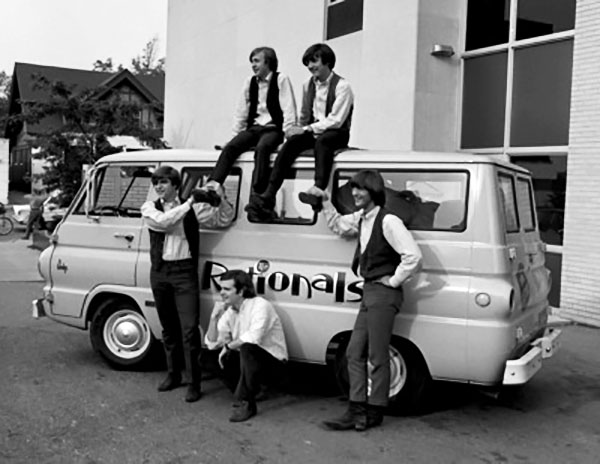
Q I’m guessing The Rationals were the first first live band you saw?
My Mom took me to see The Rationals in probably ’64, they were playing a high school. She was kind of a stage mom so she would follow them around a lot…make sure they were staying out of trouble. It was somewhere in Detroit and I was probably 9 or 10. So, yep, it probably was The Rationals.
I saw them open up for Jefferson Starship and the Lovin’ Spoonful at the State Fair with Robin Seymour. My Grandma went with us to see Jefferson Starship at Ford Theater in Detroit.
Q Hopefully they got great seats!
Oh yeah, they did. She enjoyed it. She must have been in her seventies. Scott actually introduced me to the Lovin’ Spoonful at the Michigan State Fair.
Q The band that made the Grateful Dead go electric! So did you see a lot of Sonic’s Rendezvous Band?
I saw them first play live at Joe's Landing Strip, a little club next to the Detroit Airport. Fred was leaning up against the wall, pretty nonchalant. They had a different drummer - before Rock. The band went through a couple of drummers before him, and I think Ron Cooke was in the band at the time.
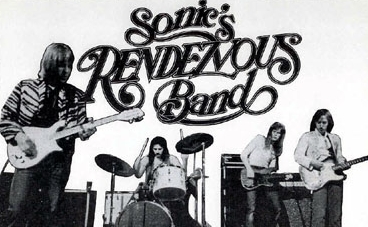
Q So this is when they were still finding their feet.
Yeah, I think so. I remember there was nobody in the club, so they looked kind of despondent. The drummer asked me if I wanted to sit in as he didn't know any of their material; I was still either in high school or just out of high school.
I think they were still rehearsing at Scott's house on Maiden Lane and that might be the place I first met Rock Action.
Later on, when Ron Cooke was still in the band, my friend Dave Klingler recorded a lot of their demos at my parents’ house. They’re all on the box set. I don’t think Cooke and Scott Asheton got along. Ron was having some trouble with this girlfriend. That’s when they got Gary Rasmussen in and started rehearsing a lot in our basement. So I heard a lot of their stuff as it was being worked up. It was so loud, it shook the house!
Q. Your folks must have been very understanding...
My parents were very tolerant and never asked them to turn down. They just had to knock off at 10pm. The only other thing my Mom asked was that they smoke outside. Because all of them smoked, there was this big plume that would come out of the basement and up into the living room.
I think my parents were just shy of being Saints, as one of their peers said once.
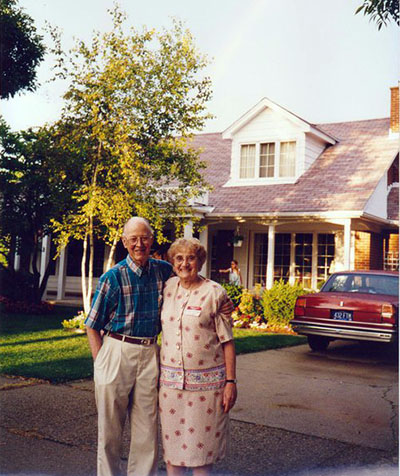 On their 50th wedding anniversay.
On their 50th wedding anniversay.
Q How did you find Fred as a person?
One of the fondest memories I have of Fred is when he, Scott and I took a boat trip on Zukey Lake and stopped at Zukey Lake Tavern to have a beer. Ricky Nelson was on the jukebox and I was trying to remember the name of the guitar player. Fred knew it right off: ‘You mean James Burton?’ He liked James Burton a lot
Sometimes he'd show up to rehearsal at my parents’ house looking rough around the edges - like he’d had a hard night of drinking or something, but mostly he was a pretty congenial guy.
We were watching the TV upstairs once and Chuck Berry was on. Somebody told Fred and he came running up the stairs and stared at the TV. He watched everything Chuck was playing. He was mesmerised. He was in the zone.
I was playing in a cover band once and he came up to see me, along with the rest of Sonic's Rendezvous Band. They stayed for a set. Once, he came over to our apartment when we had a party. He asked me who my favorite drummer was and I said Aynsley Dunbar. He said: ‘What do you think of Charlie Watts?’ and I said that I liked Charlie a lot.
So I asked him who his favorite guitar player was and he said ‘George Benson’.
Q George Benson? That's from left field but I'm probably missing something because I've only been exposed to his "hits".
Yes, his favorite guitarist was George Benson. Also Chuck Berry.
Q Chuck, I get.
Right. You know Fred studied saxophone?
Q Yes. There was a lot more to him that met the eye, I think. Was he very introverted? People who knew him describe him as socially withdrawn.
He was never introverted around me. Like I said, we had that nice trip to Zukey Lake Tavern. On that same trip, he went to go see his old house with his ex-wife, where their son had died of SIDS .it was one of his favorite spots, so he was kind of mystical.
He didn't like anyone touching his amplifier. My band shared rehearsal space in the basement of my parents. I once told our guitar player that he could use Fred’s Marshall. Fred knew somebody had been using it, because the knobs had been changed. He told my guitarist that it wasn't cool that he’d used his amp and that was that.
Q So to the question everybody asks. Why didn’t Sonics’s Rendezvous Band make it?
I think it was partly to do with management. They really didn't have good management and people like Bob Seger did really well because they did. Punch Andrews was a good manager for Bob. He really moved his career along.
My take on Sonic's Rendezvous Band is that they were they were extremely loud and they were very good. Chato Hill was the manager for Sonic's Rendezvous Band. He was working in advertising in Detroit. Freddie Brooks was the road manager and kind of booked some gigs; that (management) was just part of the problem.
I don't know if Fred wanted to move as fast as Chato Hill wanted to. You’d probably have to ask Scott about that. Somebody came into the dressing room once and was talking to Fred, telling him he needed to take the bull by the horns and start moving the band forward. Fred answered: ‘I know what I'm doing.’
I also believe part of the problem was that they were in Detroit. Had they been in Los Angeles or New York or London, the chances of being signed to a label would have been greater.
They probably could have recorded more and done an album. It was a financial issue and none of them really had any money to speak of. They were kind of living with their girlfriends or existing hand-to-mouth, pretty much. Scott was able to live with our parents so he didn't have much in the way of overheads.
Scott (Morgan) and Rock did some tree trimming work and then later on Scott Asheton worked at a frog farm in Dexter to make ends meet. Scott Morgan helped move pianos and worked at Eden Foods.
Q Frog farm! Wow!
Yeah, Dexter was a town just west of Ann Arbor small town and I believe the frogs were used for dissecting for schools and things like that. I believe that's when he was living with his girlfriend Liz out at the lake. Scott (Asheton) lived pretty frugally. So did Ron did before they got back together with the Stooges.
cyIf they got beer and cigarette money they were happy. Also, I guess back then it was easier to live frugally.
Sonic’s Rendezvous Band simply didn't make much money from gigs. Before one of their shows at The Second Chance in Ann Arbor, the music store came and confiscated Scott Asheton's drums. He asked if he could borrow my kit and I declined, which I’ve always felt bad about. Scott was notorious for breaking drum heads and cracking cymbals. I think that's why I declined. A local lighting man Jeff Alder, who used to work for Fantasy Lighting let him use his kit.
Once Rock didn't have enough money for drumsticks for rehearsal so he used a couple of wooden dowels for practice.
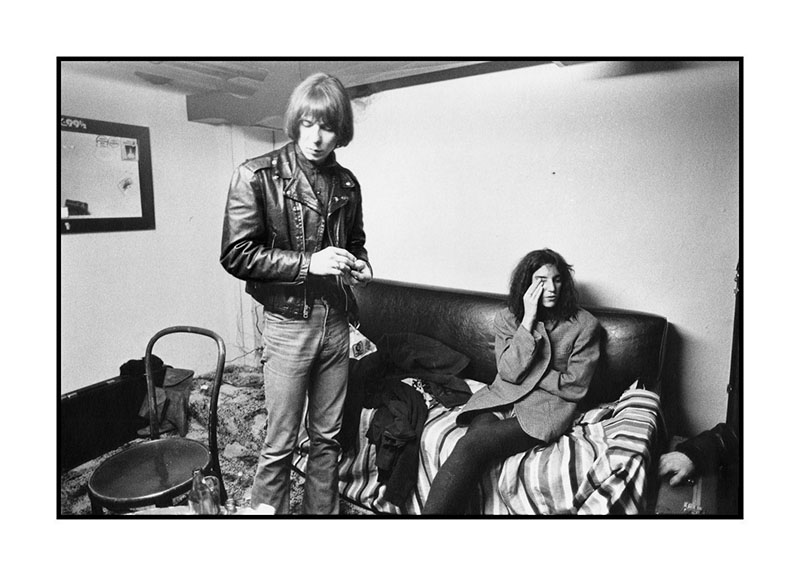 Fred and Patti, the future Mrs Smith, backstage at a Sonic's Rendezvous Band show. Sue Rynski photo
Fred and Patti, the future Mrs Smith, backstage at a Sonic's Rendezvous Band show. Sue Rynski photo
Q Did you see the power balance shift over the life of the band?
Yes. My brother Scott used to talk about that. It seemed like less and less of his songs were being used in the set ,and I think it bothered Scott quite a bit actually. I think that he and Fred were two creative forces that worked well together and complemented each other, but it just got to be too much of a power struggle between them. Scott always capitulates.
The same thing happened in Guardian Angel. Al Jacquet did the same thing and was kind of taking over the band. I don't know if Fred and Wayne had the same problem in the MC5. I thought Scott said something about how he thought Wayne was hogging all the solos when they played.
It's a pity but all bands have a lifespan. It's one thing or another.
I got to see them at some interesting shows - like The Second Chance with Patti Smith, where I saw her for the first time. And they played with the Ramones, who I also saw for the first time. A lot of people actually walked out on both those bands.
It's funny that whole era of music happened pretty fast - from ’76 to the early ’80s.
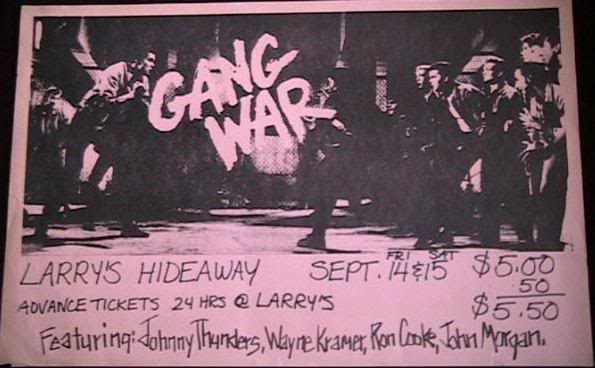
Q So let’s talk about you joining Gang War with Johnny Thunders and Wayne Kramer. Had you had much to do with Wayne Kramer before then?
I had met Wayne when he was living in Ann Arbor late ’69 or ’70. He used to be part of a group that had pick-up softball games. My brother Scott gave him a ride home after the game to his house on Pauline and Main streets. He lived there with his girlfriend. The Jaguar he got from the MC5’s record advance was in the driveway. It had been in a wreck. He wasn't too happy about and said his old lady had done it.
I saw the 5 twice. Once at Meadowbrook with The Rationals. It was raining and all the kids were sliding down the wet grass outside.The police did not want to let them in the front gate. Someone made an announcement about it over the PA and the crowd started to go crazy, demanding in. The 5 arrived and drove their van down through the crowd and everybody started cheering.
The other time I heard them was at a free concert at West Park in Ann Arbor. My brother Scott introduced me to Rob at the time. A really great guy.
From what I heard, prior to Gang War, Wayne had just gotten back from London and had recorded the single, “The Harder They Come”. I know he had done a Battle of The Guitars with Ted Nugent at The Masonic Temple as well. He had not been out of the joint long when I met him in Gang War.
Q. Your brother Scott was s a catalyst for you trying out for Gang War?
After I went to Europe with Vantage Point that summer, Ron Cooke hooked up with Wayne and Johnny. Johnny and Wayne ran into Scott at a Sonic's Rendezvous Band show in Detroit and they were looking for a drummer. Scott mentioned my name so I went an audition at Sureshot Productions in Detroit
Ron wanted me to be in the band.
After my rehearsal try-out, Wayne called me up and told me I had got the gig. We talked about drumming styles and what they didn't like about the drummers they’d been using. He said they were doing too many fills, so I said: ‘Well, sometimes more is less’. Then Wayne said: ‘And less is more’.
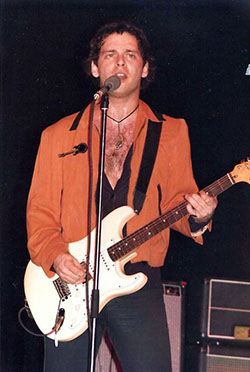 |
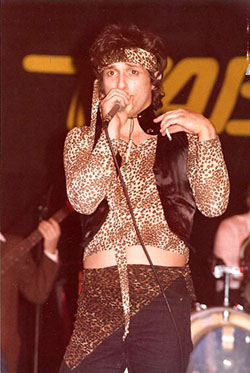 |
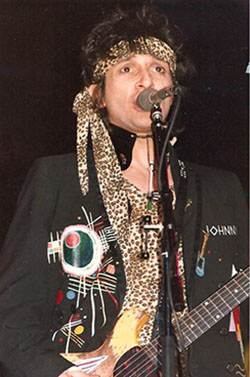 |
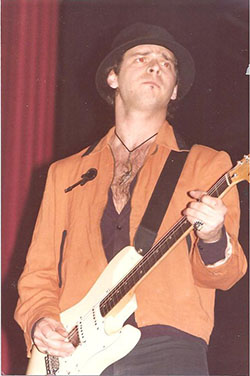 |
| Scott Foster photos | |||
Q What was your first impression of Johnny?
He was kind of dangerous looking when I showed up, with all the tatts on his arm
Q Had you heard of his other bands before joining Gang War?
No, I wasn't really aware of the New York Dolls or the Heartbreakers prior to hooking up with Wayne, Johnny and Ron. Scott knew who the New York Dolls were because Johnny was hanging out with Fred Smith in Hollywood in the early ’70s.
As soon as I found out who he was, I went out and bought the New York Dolls albums and the Heartbreakers LP, just to study the material. Scott already had all the MC5 material, so I listened to that as well.
Q Tell us about the early rehearsals and shows. Johnny Thunders had moved to Detroit with his then-wife and kids? I presume part of the motivation about him leaving NYC was to kick drugs?
Johnny had moved from New York with his wife Julie and their kids. His wife's name was Julie Jordan and she was from Texas and they’d got married in NYC. They moved in with Gary Burmele (also known as Brim). who was trying to get them off the dope. They had Johnny on a brown rice macrobiotic diet - which he hated.
Gary was a friend of Scott’s; he was kind of a small-time grass dealer (and probably coke too.) They moved into his house in Dexter, Michigan.
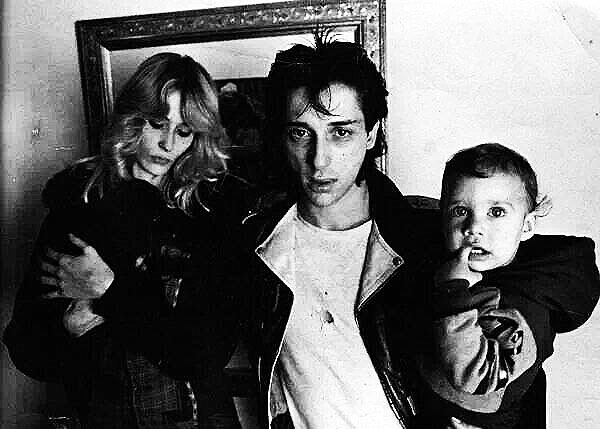
I think things were getting weird for Johnny out there at Dexter with Gary and the whole family situation, and that's when they moved in with Helen Kane in Ann Arbor at her apartment.
We had been doing some rehearsing at Brim’s house and Dexter, and ihen in my parents’ basement in Ann Arbor
Q You jumped in at the deep end. I believe it was one local show and then off on tour to Canada?
We did one show in Detroit - I think it was the New Miami in Cass Corridor - and then we went and did two nights at Larry's Hideaway in Toronto Canada, where we recorded the live tapes.
Q Jumping ahead, how many shows do you think you played with Gang War all up?
Wow, how many shows did I do with Gang War? We did maybe close to 10 around the Ann Arbor-Lansing areas. We did a couple of East Coast tours where we rented a mobile home and then came back to Detroit after those gigs were over. Then Wayne and Johnny decided to move to New York and asked me to go. So we did a lot of New York dates up and down the East Coast probably close to fifty or sixty maybe I believe I was with them from September to June or July 1980.
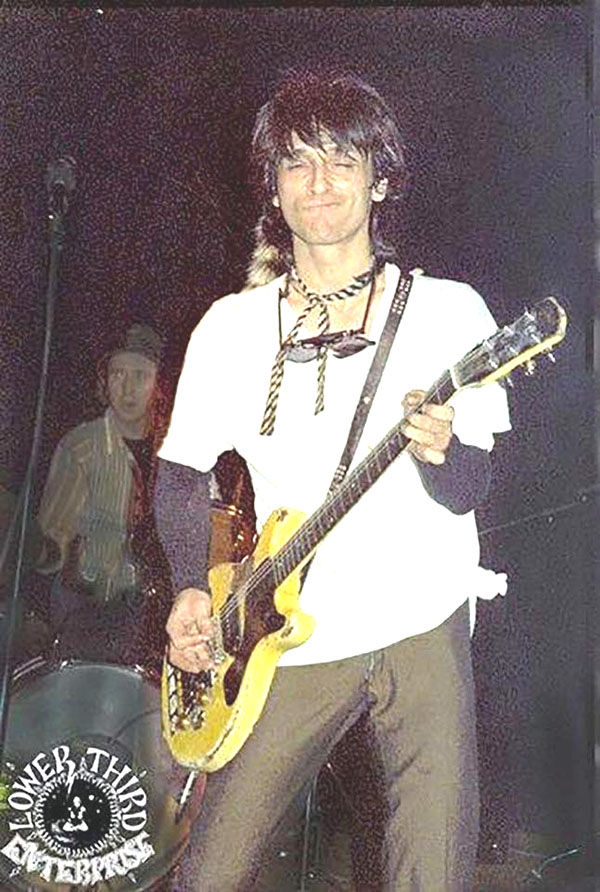 Johnny Morgan holds down the beat. Johnny Thunders hits a note.
Johnny Morgan holds down the beat. Johnny Thunders hits a note.
Q How did you find the material? Going by the bootlegs and demos, there seemed to be some divergent musical paths going on. Were Kramer and Thunders overtly aware of that?
Divergent paths with Wayne and Johnny? I think they always did have different styles of music that they pursued Wayne probably wanted to draw Johnny more into R&B type music, but Wayne was aware of a lot of other style of music as well.
We all went to see The Specials; I know Johnny and Wayne both liked them when they came to Center Stage in Detroit. We saw the Dead Boys at The Second Chance in Ann Arbor and at Center Stage in Detroit.
Johnny liked pop music as well - probably moreso than Wayne. Johnny liked “These Boots Are Made For Walking” by Nancy Sinatra. He liked the Shangri Las and The Turtles. I think the mix of styles worked well for a while.
The real problems were the drugs; Johnny wouldn't show up on time or wouldn’t be able to perform. That led to a financial problem and then, when we moved to New York, Johnny was doing Heartbreakers dates, as well as Gang War shows, and Wayne was not happy about that
Q. We’ve heard about some of the more debased behaviour over the years as Johnny slipped in and out of old habits. Was he clean at the start of Gang War and were you aware of his downhill slide? Or did everybody tolerate it?
I think at first, people very firmly tried to get Johnny onto a healthy diet and away from the drugs. He just smoked a little pot and drank White Russians. But then you could see at some gigs where he couldn’t even play his guitar or was falling over. You could see right away that there was a problem. Ron used to call it watching a train wreck in slow motion.
Q Wayne was doing his best to stay on the straight and narrow but it must have been hard being around that behaviour?
Yes, after we moved to New York he was back in the bag. He was getting healthy for while. He was jogging in Central Park and stuff, but I think after while it was just too much of a temptation.
Q What sort of gigs were Gang War playing when they moved out of Detroit and was there any prospect of a label taking an interest?
We made a lot more money when we went to the East Coast. We were talking to Jake Riviera and Slash Records. We had an attorney working for us but it all fell apart when Gary Burmele said that he wanted to produce the band. That's where we lost the deal.
We toured all over the East Coast. The New York dates were a lot more high profile than we’d been playing. David Johansen sat in with us. Willy DeVille and Jimmy Osterberg. Anita pallenberg would show up. Deborah Harry was there. She was producing the B-Girls and they opened up shows for us.
Martha Quinn (MTV video jockey) showed up one gig and Johnny spat in her mouth when she threw a drink on the stage at My Father's Place in Long Island. Robert Palmer (the writer) came out to see us at The Ritz in New York City We played The Heat and The Mudd Club and it was a really interesting time.
Q. Is it true Johnny tried to persuade your brother Scott to join Gang War? How did that play out?
Scott and I had been going out to Johnny's house where he was living with Brim to hang out listen to records. Johnny was trying to help me talk Scott into joining Gang War. I think he’d heard “Respect” and “I Need You” on an AM oldies station in Detroit and was pretty impressed with his work with The Rationals. He also liked what he’d heard of Sonic's Rendezvous Band.
But I told Johnny: ‘I think he's in Sonic's Rendezvous Band’ and then Scott said: ‘Yeah, I'm still in Sonic's Rendezvous Band.’
 Wayne and Johnny. Sue Rynski photo
Wayne and Johnny. Sue Rynski photo
Q What prompted the move to NYC? Ron Cooke stayed in Michigan and you were joined by another bass player?
We were spending most of our time commuting to and from New York to do gigs and Johnny and Wayne decided that it was more beneficial to move there. They were probably right in that matter because it was more of a high-profile town with a better chance to get signed. Unfortunately the drugs took over
Ron did not go to New York with us. He decided to stay in Ann Arbor. We auditioned some bass players. We had one kid we tried - he played one gig at Max's Kansas City and got his bass stolen. He was a brother of one of the road crew or a friend. Then we decided on using Bobby Thomas on bass, and he was with us until the end think July or August of 1980.
Q. What were the band’s circumstances like in NYC? Was this after Johnny split from his wife? I get the feeling that him returning to NYC wasn’t the best idea.
Yes. He had been living with his family in a small apartment with Mike Caton in Michigan and things didn't work out. It was getting too weird at his house and he and Julie weren't getting along.
I think the dope was more part of the social music scene in New York that it was around Detroit and Ann Arbor, that's for sure.
Q. At what point were the studio tracks done? How did they come about?
The studio tracks were done after we came back from Toronto at Morgan Sound in Ann Arbor. it's where we did “Hey, Thanks’, “Crime of the Century”, “MIA” and “Call Me Gypsy”. The sound quality of the versions in circulation is really bad. It's second and possibly even third generation. I've got a lot better copy of them.
They were done as demos for Jake Riviera and Slash Records.
Q. Have you seen “Looking for Johnny”? What did you think?
Yes my son and I went to the premiere in Santa Monica. I met the producer out front - a Spanish gentleman - and introduced myself. He said: ‘Oh yeah you're in the movie.’ We watched it. I thought it was well done.
Q. How did Gang War wind up and what did you do from there? I believe you played briefly with Garry Quackenbush of SRC?
Our last gig was at The Ritz. I was back in Ann Arbor by then and Wayne flew me out for it . It was called Boys Night Out and that's when the writer Robert Palmer was there. Lenny Kaye played with us on that bill. Iit was a good night it was packed. That was the last show I did with them and then I came back to Ann Arbor.
Gary had a band called Hannah and The Tornadoes. It was this sultry blonde who wore leather pants. She was the \was the front gal. It was OK. It was just something to do.
Q. Scott had formed Brothers Of The Road before or just after you moved home? Where does Guardian Angel and Lightning fit into the chronology and what was the extent of you involvement?
Guardian Angel was first and then Lightnin’. After Scott left that band, I was in Brothers of the Road with him, Ron Cooke and Harry Phillips as well as Steve Dansby and sometimes Mike Caton. Scott and I had a brief band together.
Q. Tell us about your other brother David’s musical doings.
My brother David was the drummer in Guardian Angel that morphed into Lightnin’, David is living just sat outside of Nashville in a city called Franklin. He originally moved there to pursue songwriting. He was also out in Los Angeles for a while. He’s a very good songwriter as well as a great drummer, and that's what he was doing after he left Lightnin’.
Q. What was the extent of your own involvement with the Scott Morgan Band? Talk about your West Coast move.
I did some recording with the Scott Morgan Band and when we were in the studio, he brought Scott Asheton in to do some drum parts. We worked at Ambient Studio in Orchard Lake, Michigan, and did a video for “She’s Wild”.
Then we did some songs out at Schoolhouse in Ann Arbor; one of them was “Rhythm Communication”. So we had two drummers there for a while - me and Scott Asheton. Mike Caton was on guitar, Gary Rasmussen on bass, Scott's then-fiance Kathy Deschane on backing vocals - and Scott, of course,
I left to go play in a blues band with Steve Nardella.
I moved to Los Angeles in 1990. I kicked around in various blues bands. Probably the most success I had with the blues bands. Lester Butler (who was in The Red Devils) and I had a band called 13 and did an album. I played with King Ernest, who was working with a blues outfit, and we did some touring in Europe and California
I played with Paul Burlison and Rocky Burnette. We toured the country and recorded at Mountain Stage at the end of the tour I did an album with Robert Lucas called “Completely Blue”. I did two albums with Jamie Wood and the Roadhouse Rockets.
I toured with Candy Cane, played with Roy Gaines, who played with Chuck Willis (“CC Rider”) and Bobby Bland. I did some playing back in Detroit with Jimmy McCarty and John Fraga of The Rockets. Then I went back to school and got my associate degree in music, an associates degree in radiography and a graduate degree in MRI. I shot X-rays and did MRI for a while but right now I'm working for Audi Motors testing cars as a test car driver.
Q. If you had one musical role model from back in your Michigan days, who would it have been?
My role models are my brothers Scott and David. You can add my parents to that, too.
Q. Since we’re in a bar, what are you drinking?
We would be having a White Russian - as Johnny would have it.

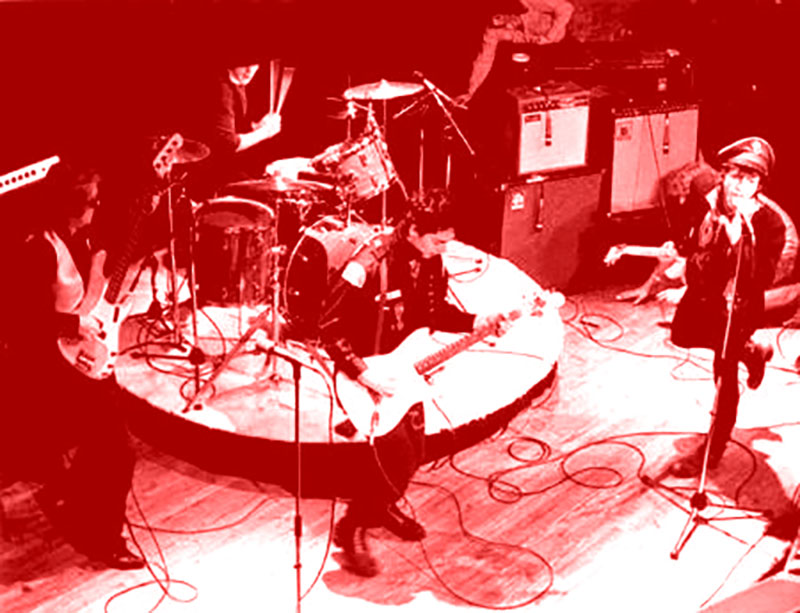 Gang War at Second Chance in Ann Arbor in 1979. Sue Rynski photo
Gang War at Second Chance in Ann Arbor in 1979. Sue Rynski photo 